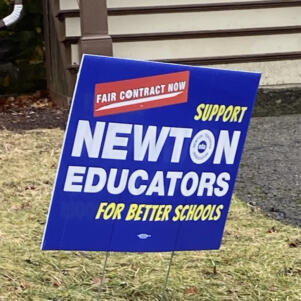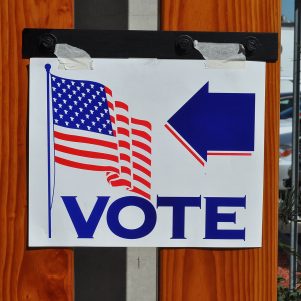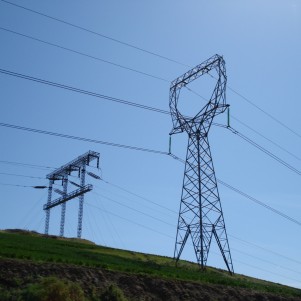Mass. Center for Civic Education promotes engaged citizenship among students
By Mary McCleary | July 15, 2016, 6:50 EDT
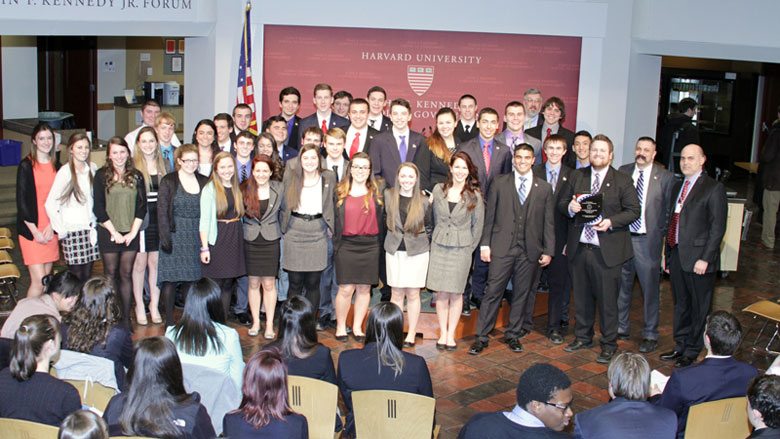 MA winning team at the We the People competition. (Courtesy MA Center for Civics Education)
MA winning team at the We the People competition. (Courtesy MA Center for Civics Education) When history teacher Roger Desrosiers received a postcard from the Center for Civic Education in 1987 offering free classroom materials for the U.S. Constitution’s bicentennial, little did he know that the organization would become his life’s work. After decades of promoting the study of American history and civics, Desrosiers is now President of the Massachusetts branch of the non-profit, non-partisan foundation. The CCE operates the nationwide We the People and Project Citizen programs that promote civic participation. Their mission is to form responsible citizens who are educated in the principles of democracy.
Desrosiers emphasizes that students need to learn about the American form of government to acquire the skills that will enable them to actively contribute to society. He feels they need to understand the Founders’ vision for our political system so they can determine their own views on how the principles should be applied. “To understand democracy, students need to learn about our system of government through its historical, experiential, and philosophical underpinnings, and bring that knowledge to the present.”
“To understand democracy, students need to learn about our system of government through its historical, experiential, and philosophical underpinnings, and bring that knowledge to the present.” — Roger Desrosiers
To achieve that end, the MA Center for Civic Education promotes civic learning and engagement in the curriculum of primary schools through higher education, and also throughout the community. Their aim is to help people understand and navigate local, state, and national government.
Desrosiers explains that the CCE began in 1987 when it launched the We the People competition. It was funded by the National Bicentennial Commission for the U.S. Constitution, chaired by former Chief Justice Warren Burger. Since the project was launched, it has been used in over 200 Massachusetts schools.
The We the People program provides textbooks and related materials to high school history classes. After studying U.S. government during the year, students compete against other schools in their state in a format designed to resemble a congressional hearing. Teams of 3 or more students prepare a set of questions, and testify either pro or con about a selected issue before a committee of judges. Each group gives a 4-minute presentation, and the judges subsequently ask follow-up questions.
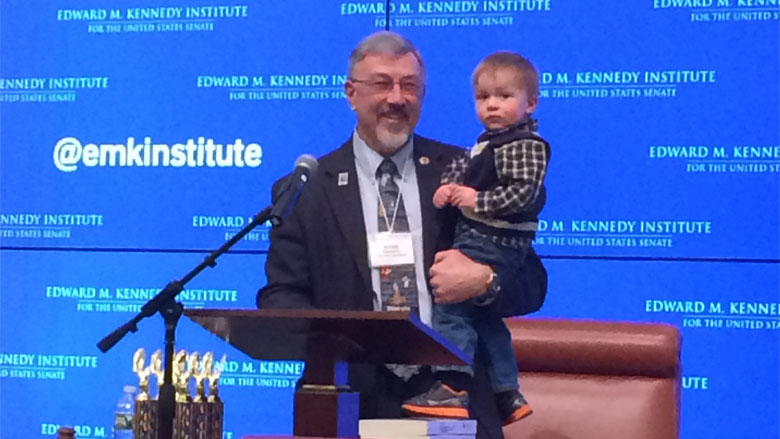
MA Center for Civics Education President Roger Desrosiers (with grandson) at the state finals. (Courtesy, MA Center for Civics Education)
In Massachusetts, the full day competition is held at venues such as the Harvard Kennedy School of Government, the Moakley Federal Courthouse, and the Edward Kennedy Institute for the U.S. Senate. The winning team travels to Washington, D.C. to compete against other states in the finals. Students often meet with their representatives in the capitol. Many congressmen and senators are delighted to host the young participants. Desrosiers recalls that Senator Ted Kennedy was a particularly avid supporter.
“The result of the elimination of the history test in Massachusetts has been the marginalization of many social studies programs.” — Roger Desrosiers
He also notes that students who compete in the We the People contest often remember the topics they study in the classroom long after their lessons. Desrosiers explains that pupils are taught the history of ideas and the reasons behind them, instead of merely memorizing a list of facts. Each lesson includes critical thinking exercises and interactive activities so they not only study information, but also interpret it through thought-provoking questions. As a result, students are able to think through what they are learning. “In the We the People program, we encourage students to take, defend, and evaluate a position on crucial issues,” he observed.
Despite their success, however, the federal government ceased funding the Center for Civic Education in 2011 because of a mishap that designated their programs as earmark items. Desrosiers disputes that decision, since the programs are used in every state and district. Nevertheless, both We the People and Project Citizen have continued with the help of dedicated teachers and community volunteers.
The organization has also benefitted from the U.S. Dept. of Education’s SEED grant funding for their James Madison Legacy Project, which provides professional development for civic education teachers. Desrosiers noted that Massachusetts joined other New England states to become a regional recipient of the grant. The group plans to offer professional development for 30 New England teachers annually.
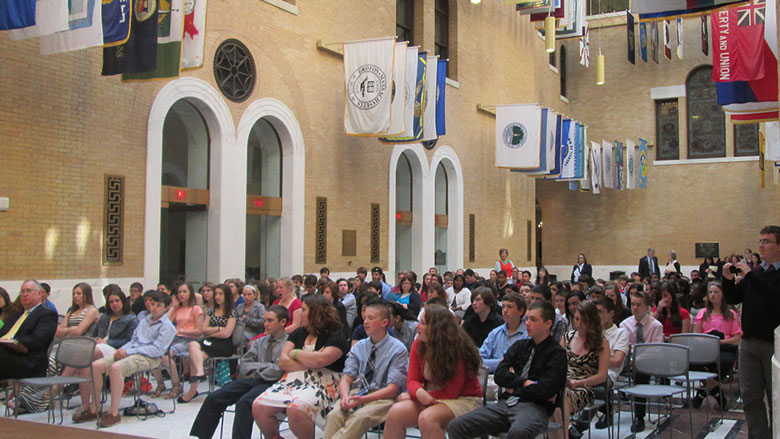
Students at the Project Citizen showcase. (Courtesy, MA Center for Civics Education)
Desrosiers maintains that supporting social science teachers is more urgent than ever, since there has been a sharp decline in history courses at all levels of education. The problem was compounded by the Patrick administration’s decision in 2009 — with the support of the Mass. Dept. of Elementary and Secondary Education — to eliminate state history tests for grades 5, 8, 10 and 11.
According to Desrosiers, the policy has had widespread ramifications. “The result of the elimination of the history test in Massachusetts has been the marginalization of many social studies programs. Because math and ELA scores are used to measure a school district, history and civics can be casualties in an attempt to improve those scores. Also, several history departments have become humanities departments, and teachers outside the history discipline are teaching history or social studies, which is allowed by state law.”
Desrosiers further emphasizes the importance of teaching history and civics courses separately. “History, through its content, addresses the critical thinking that students should bring to understanding its events and outcomes. Civics emphasizes the role of the citizen in our democracy by understanding its principles, values and institutions. They are both necessary to form better, more well-rounded citizens.”
Desrosiers is also proud of the fact that when he was a teacher, his students could never guess his political affiliation. Often students would think he supported a different viewpoint from his own, because he invariably advocated the opposing side better to maintain objectivity. Desrosiers wanted his students to develop their own thought processes and judgments based on research into both sides of an issue. He explains that the We the People program is valuable because it gives students questions and then asks them to research, investigate, and defend a point of view. This technique is especially effective since many people increasingly rely on single, advocacy-based websites for their news, without hearing other perspectives.
Despite the challenges in promoting American history and civics education, Desrosiers identifies several positive developments in the Commonwealth. The first is the Civic Learning and Engagement Task Force, established by the Mass. Dept. of Elementary and Secondary Education. Desrosiers is a member of the group, which meets regularly to discuss how to increase civics education in schools. Another hopeful sign is that the DESE is reworking the framework of the history and social science curricula. The expectation is that these subjects will be tested once again, preventing further marginalization of fields. Finally, the first civic literacy conference was held recently by the DESE, and hosted by the Edward Kennedy Institute for the U.S. Senate. Desrosiers believes these initiatives will help ensure that students are given the necessary knowledge and skills to become active and invested public citizens.
Contact Mary McCleary at [email protected].
NBPDemocracy

